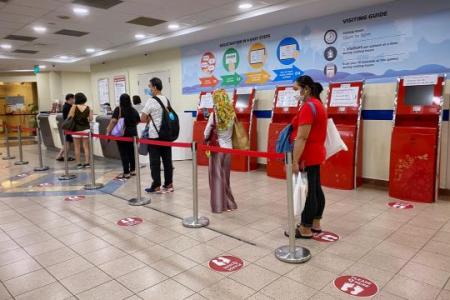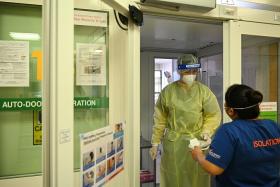Vaccinated people allowed to visit hospitals, residential care homes from Nov 22
SINGAPORE - Vaccinated people will be allowed to visit hospitals and residential care homes from Monday (Nov 22), provided those being visited are also inoculated.
However, concessions will be made for the medically-ineligible as well as those in exceptional circumstances.
The Ministry of Health (MOH) announced this on Saturday (Nov 20) as it brought an end to nearly two months of strict curbs to tackle Singapore's worst Covid-19 outbreak since the start of the pandemic.
From Monday, along with group size limits on social gatherings and dining-in being upped to five, in-person visits to hospitals and residential care homes can resume with vaccination-differentiated safe management measures (VDS) in place.
"We are balancing the need to support the well being of our patients and home residents to facilitate their receiving of close family support that is conducive for recovery, while at the same time continuing to protect vulnerable individuals in these hospitals and homes," said Singapore's director of medical services Kenneth Mak at a press conference by the multi-ministry task force handling the pandemic.
For hospitals, each patient can receive up to two visits daily, and register up to two visitors each time. But only one visitor will be allowed by the bedside at any one time, and each visit must last no more than 30 minutes, though this may be extended under exceptional conditions.
Patients who are critically ill can admit up to five registered visitors, with two visitors allowed bedside each time.
For homes, up to four visitors are allowed, with one designated visitor per visit, and each visit capped at 30 minutes.
Visits will be allowed only when hospital patients or home residents and their visitors are all fully vaccinated.
"If the patient/resident and/or visitor are not fully vaccinated, in-person visits will only be allowed under exceptional circumstances on a case-by-case basis, as advised by the hospitals and homes," said MOH, noting that the measures for visits do not apply to those seeking medical care at hospitals.
Exceptional conditions include patients in critical condition; paediatric patients; birthing or post-partum mothers; and patients requiring additional care support from caregivers.
"The strict implementation of such VDS measures will minimise the risk of outbreaks, which may otherwise jeopardise the lives of vulnerable patients and residents and affect the operating capacity of our hospitals and residential care homes," the ministry added.
Singapore has reported over 1,000 cases a day since September, though numbers have waned in recent days and 85 per cent of its population is vaccinated. The number of cases in hospitals has also dipped slightly, with fewer patients in intensive care units (ICUs).
According to an MOH release, visitors to hospitals and homes will also need to show a valid negative antigen rapid test (ART) result obtained within the last 24 hours of their visit.
Those who have recovered from Covid-19 within the last nine months or so are exempted from this testing requirement.
Visitors can either self-administer the ART or head to MOH-approved test providers, including those performed at Quick Test Centres. If self-administered, a time-stamped photo of the dated test result must be presented before entering the hospital or home.
In its release, MOH reminded visitors to hospitals to don face masks with good filtration capability at all times. These include surgical masks and reusable masks with two layers of fabric, it said.
Visitors should also avoid eating or drinking in hospital wards; using patients' toilets in the wards; and sitting on patients' beds.
For homes, visits will be suspended if there is an active Covid-19 cluster.
"MOH will also review these measures regularly in line with the evolving Covid-19 situation, so as to reduce the risk of Covid-19 importation and transmission in our healthcare institutions and residential care facilities," said the ministry.
Get The New Paper on your phone with the free TNP app. Download from the Apple App Store or Google Play Store now


